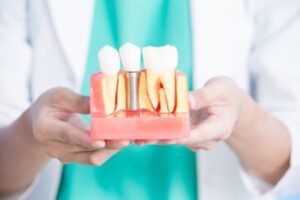When to Get Dental Implants: The Sooner The Better

Dental implants are designed to function like natural teeth, providing stability and comfort that other options, like dentures, may not offer. They can significantly improve your quality of life by allowing you to eat, speak, and smile with confidence. Even with all of the benefits dental implants, offer, some people postpone treatment to correct missing teeth.
They may think the only reason to replace a missing tooth is for aesthetic reasons. They may also presume that the timing to replace a missing tooth isn’t that significant.
Is it ever too late to get dental implants?
It is rarely too late to restore your smile and confidence with dental implants. The primary considerations for dental implant eligibility are overall health, healthy gums, and bone density. Dental implants may be a viable option if you’re in good general health and your jawbone has sufficient density. Even if bone loss has occurred, procedures like bone grafting can often be performed to prepare the site for implants.
What can happen if you delay treating missing teeth?
Long-term challenges as a result of delaying treatment for missing teeth do arise, that’s why we recommend dental implants sooner rather than later. Here are some of the potential complications of delaying treatment for missing teeth:
Deterioration of the jawbone
Healthy bone tissue requires stimulation to achieve new growth. In the case of the jawbone, this stimulation comes from the pressure of biting when you eat. As you chew, force is exerted up and down the roots of your teeth and into your jaw. This force causes continual tissue growth and strength.
When you’re missing a tooth, this pressure is no longer there. Over time, as the bone is no longer stimulated to grow new tissue, your jawbone can begin to shrink causing a loss of oral bone density.
Replacing a missing tooth with a dental implant prevents bone loss by recreating the same force through a prosthetic crown and titanium dental implant. As an implant allows you to eat and chew the same way as a natural tooth, your jaw can’t tell the difference and continues to grow new bone.
Remaining teeth can shift over time
Patients who do not replace missing teeth with a dental implant right away can experience a shifting of their remaining teeth as their jaw slowly adjusts to the bone loss. Waiting too long can lead to a situation where there’s no longer enough space to easily install a dental implant in the original gap. Shifting can also cause teeth to twist and turn.
Loss of other teeth
Missing teeth can make it challenging to brush properly, increasing the possibility of decay in your remaining teeth. Combined with bone loss and shifting teeth, a patient who is missing one or more teeth has a higher likelihood of losing more teeth in the future.
Missing teeth can be more expensive and more complex to fix later
The number one objection to getting a dental implant is the cost. However, delaying the procedure can lead to costlier treatment options down the road. While an oral surgeon can use bone grafts and other techniques to regenerate bone tissue, these extra treatments add significant time and expense.
The best time to receive a dental implant is immediately after you’ve lost the tooth. You’ll save time and money while protecting your other teeth, and boost your confidence with a healthy smile.
Are You Ashamed Of Showing Your Missing Teeth?






